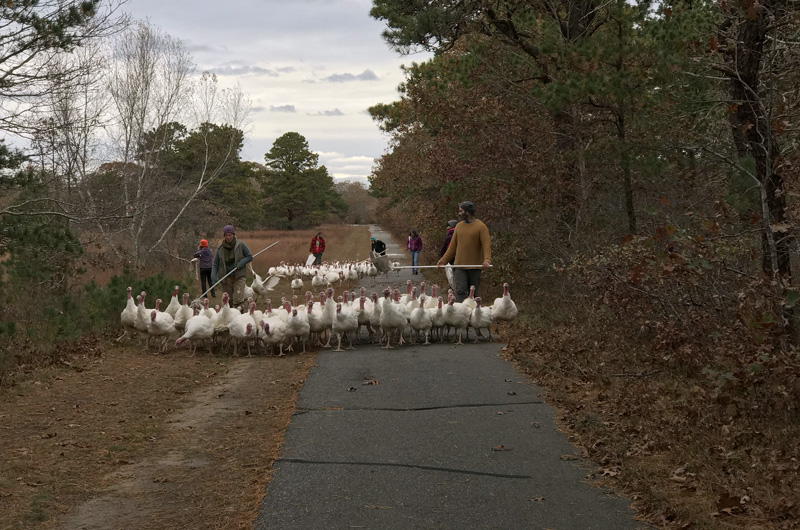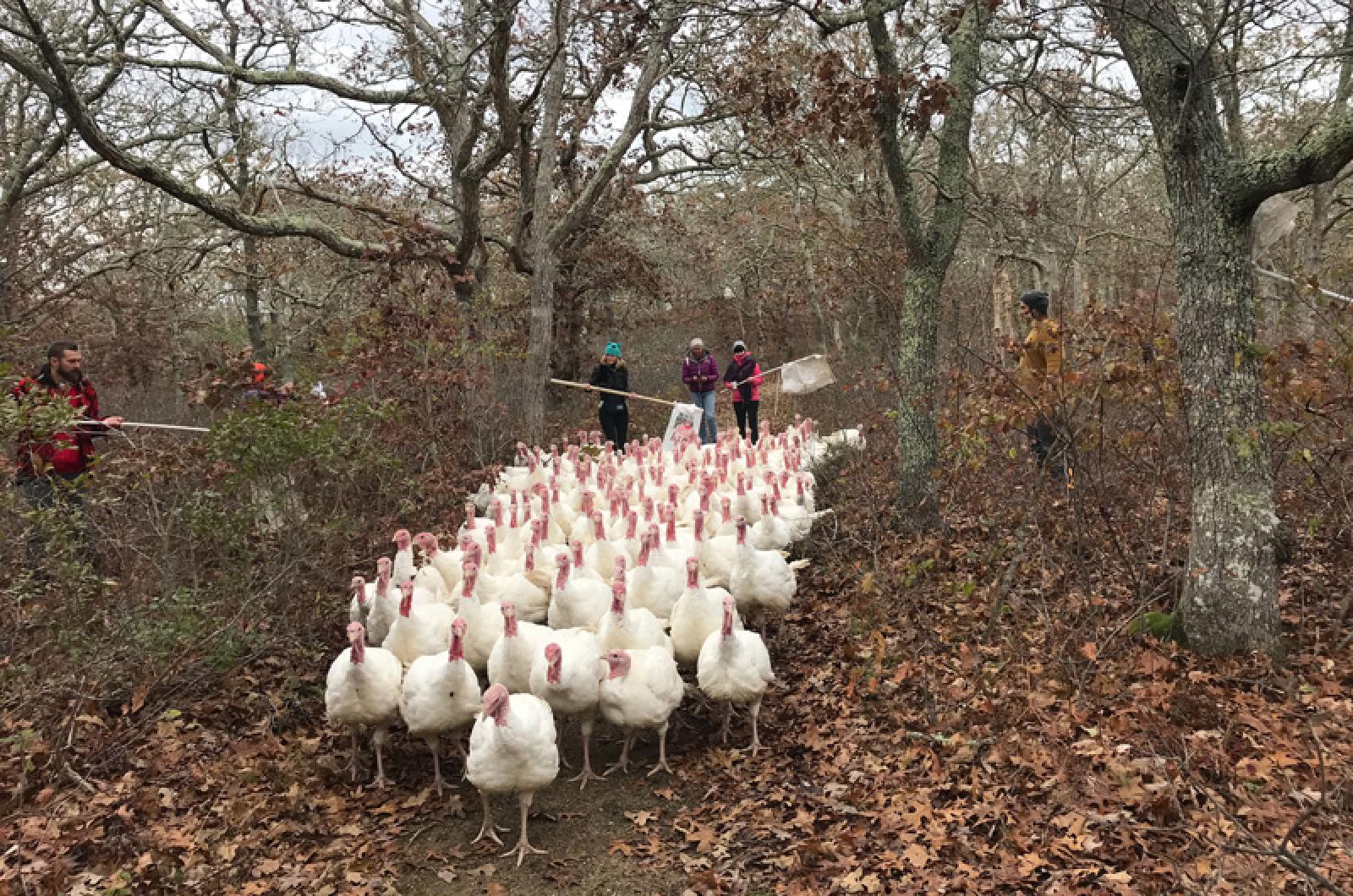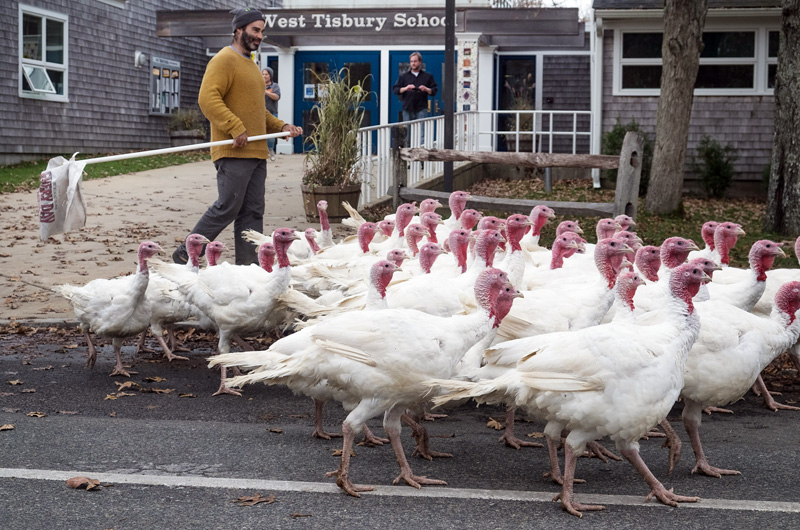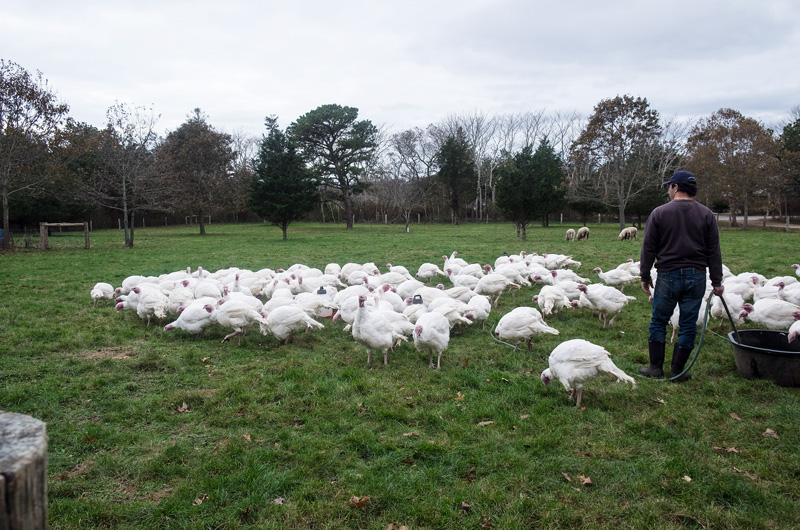It wasn’t quite like herding cats, but it was close.
Armed with makeshift flags made of feed bags tied to PVC pipes, an intrepid farm crew waved, herded, and cajoled 150 soon-to-be Thanksgiving turkeys down a woodland path in West Tisbury that was once Holmes Hole Road. But perhaps word of their impending doom had spread, because at every opportunity one of the turkeys would veer off into the woods or dart down another path, only to be shooed back to the trail by one of the feed bag flag waving farm hands.
The turkey walk was organized by Jefferson Munroe of The Good Farm and Richard Andre of the Cleveland Farm. Each year the two farmers collaborate to raise Thanksgiving turkeys and usually move them by truck to Cleveland Farm for processing on the week before the holiday.
The birds are raised in different Island locations each year. This year the turkeys matured in the grass pastures of Whippoorwill Farm on Old County Road. The location is about two miles by a route of ancient ways, open fields and bike paths to Cleveland Farm, so with the help of several farm hands, the turkey truck stayed in the farm yard, and the turkeys walked.

“People actually used to walk turkeys to Boston from the countryside for Thanksgiving,” said Mr. Munroe. “That was how you would move them. You would have 100 turkeys when you left your farm, a few would wander off, a couple others would wander in. You got there you would have 95, okay, that’s fine.”
The farmers take great pride in raising the animals in a humane, natural, and stress free environment. It takes about four months to produce a Thanksgiving size turkey. The farmers get one-day old turkeys, called poults, from a supplier who ships them through the U.S. postal service.
“They ship them the day they’re born, and they usually get here the next day,” said Mr. Munroe.
Three different batches arrive two weeks apart, so there will be different sized turkeys to fill specific customer orders. It’s a fun day to be a turkey farmer.
“People get excited,” said farm hand C.C. Licina. “You can hear them all peeping in the back of the post office.”
The poults spend the first part of their lives inside in a brooder under carefully controlled temperatures. Turkeys have a reputation for being really dumb, and finding creative ways to expire before maturity. But Mr. Munroe has a different way of phrasing that.
“I like to say that their instincts are not geared toward survival,” said Mr. Munroe. “They’re too curious. One of the batches managed to disassemble a heat lamp. We almost had smoked turkey.”
After about six weeks, the poults are turned out into a grassy field.
“They’re running around out in the sunshine eating grass, eating bugs,” said Mr. Andre. “That makes all the difference. Most turkeys are raised in massive confinement.”
The turkeys will eat every blade of grass inside their portable fencing, so the pens are moved to a new part of the pasture periodically. With all the turkey fertilizer left behind, the bare pasture springs back to life quickly.
The annual exercise in hauling turkeys by truck didn’t fit into the philosophy of raising the animals humanely.
“It’s pretty stressful on the birds,” said Mr. Munroe. “It’s the one piece of raising them that I’ve never really been happy about. We spend all this time to keep them enjoying life, then right at the end we have to cram them into a space.”
Back on the trail, Mr. Andre was worried about loose dogs disrupting the march. But living on an isolated Island does have its advantages when herding turkeys through the woods.
“No coyotes and no bears, which is kind of good for us,” Mr. Andre said.
As it turns out “turkey trot” is a misnomer. That many turkeys don’t move at anything like a trot. To the delight of schoolchildren on recess at the West Tisbury School, the operation stopped on the school soccer field for some water. The turkeys nestled down in the grass to rest their weary drumsticks, gobbling and squawking continuously. For inspiration, the turkey moving crew played marching band music on their smart phones, and soon the tired turkeys stepped off once again.
Once processed, the turkeys are taken to The Larder on State Road in Tisbury, where customers who placed orders can pick them up. The cost is $7.10 a pound, a tough price point to compete with large grocery stores which use Thanksgiving turkeys as loss leaders, charging prices far below the actual cost of producing them in order to draw customers into the stores.
“I think Thanksgiving is a really important holiday for people,” said Mr. Munroe. “I’ve had a number of Island families say this is a real stretch for us but we want to be able to serve meat that was raised and treated well for the holiday. Having them grow up on grass really does change the flavor profile. Once you’ve seen how turkeys are commercially raised, it’s hard to condone that.”
After crossing Old County Road to Nat’s Farm conservation land, the rafter (that’s what you call a bunch of turkeys) proceeded down the bike path that borders Cleveland Farm. After a four hour march, the procession arrived, with at least two turkeys that had to be carried for the final part of the journey.
The birds are not the only ones coping with holiday stress.
“This is by far the most stressful week of the year for Richard and I,” said Mr. Munroe. “The biggest holiday of the year, for a lot of people, depends on us not screwing it up.”









Comments (5)
Comments
Comment policy »